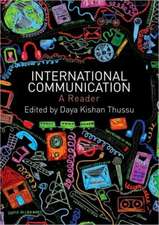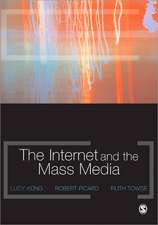Design Thinking Research: Studying Co-Creation in Practice: Understanding Innovation
Editat de Hasso Plattner, Christoph Meinel, Larry Leiferen Limba Engleză Paperback – 23 feb 2014
Preț: 784.30 lei
Preț vechi: 1031.97 lei
-24% Nou
Puncte Express: 1176
Preț estimativ în valută:
150.10€ • 155.06$ • 124.92£
150.10€ • 155.06$ • 124.92£
Carte tipărită la comandă
Livrare economică 22-28 martie
Preluare comenzi: 021 569.72.76
Specificații
ISBN-13: 9783642428180
ISBN-10: 3642428185
Pagini: 292
Ilustrații: XII, 280 p.
Dimensiuni: 155 x 235 x 15 mm
Greutate: 0.41 kg
Ediția:2012
Editura: Springer Berlin, Heidelberg
Colecția Springer
Seria Understanding Innovation
Locul publicării:Berlin, Heidelberg, Germany
ISBN-10: 3642428185
Pagini: 292
Ilustrații: XII, 280 p.
Dimensiuni: 155 x 235 x 15 mm
Greutate: 0.41 kg
Ediția:2012
Editura: Springer Berlin, Heidelberg
Colecția Springer
Seria Understanding Innovation
Locul publicării:Berlin, Heidelberg, Germany
Public țintă
ResearchCuprins
Design Thinking as Innovation Foray (Christoph Meinel and Larry Leifer). - Part I Road Maps for Design Thinking. - Tele-Board: Follow the Traces of Your Design Process History (Lutz Gericke, Raja Gumienny, Christoph Meinel). - Understanding Radical Breaks (Jonathan Edelman, Avantika Agarwal, Cole Paterson, Sophia Mark, Larry Leifer). - If you want to know who you are, tell me where you are: The Importance of Places (Julia von Thienen, Christine Noweski, Ingo Rauth, Christoph Meinel, Sabine Lang). - Creativity and Culture: State of the Art (Hannah Kim, Siddharth Mishra, Pamela Hinds, Lei Liu). - Part II Creative Tools and the Importance of Prototypes in Design Thinking. - Design Loupes: A bifocal study to improve the management of engineering design innovation by co-evaluation of the design process and information sharing activity (Rebecca Currano, Martin Steinert, Larry Leifer). - Towards Next-Generation Design Thinking II: Virtual Multi-User Software Prototypes (Gregor Gabrysiak, Holger Giese, Andreas Seibel). - Parallel Prototyping leads to better design results, more divergence, and increased self-efficacy (Steven Dow, Scott Klemmer). - Part III Distributed Design Collaboration and Teamwork in Design Thinking. - Towards a Shared Platform for Virtual Collaboration Monitoring in Design Research (Thomas Kowark, Matthias Uflacker, Alexander Zeier). - Communicating Meaning & Role in Distributed Design Collaboration: How Crowdsourced Users help inform the design of telepresence robotics (David Sirkin, Wendy Ju). - Teamology – The art and science of design team formation (Greg Kress, Mark Schar). - Monitoring Design Thinking Through In-Situ Interventions (Micah Lande, Neeraj Sonalkar, Malte Jung, Christopher Han and Banny Banerjee). - Part IV Design Thinking in Information Technology. - On the Perception, Adoption and Implementation of Design Thinking in the IT industry (Tilmann Lindberg, Eva Köppen, Ingo Rauth and Christoph Meinel). - Determining the Effect of Tangible Business Process Modeling (Alexander Lübbe, Matthias Weske). - Applying Design Knowledge to Programming (Bastian Steinert, Robert Hirschfeld).
Textul de pe ultima copertă
This book summarizes the results of the second year in the Design Thinking Research Program, a joint venture of Stanford University in Palo Alto and Hasso Plattner Institute in Potsdam. The authors have taken a closer look at the issue of co-creation from different points-of-view. The concept of co-creation can also be applied to the phase in which new ideas and related thought start to influence companies, the economy, our culture, and society. The perpetual pursuit for inventions, new creations and innovations is inherent in human nature. The concept behind co-creation may sound simple, however, it is both an essential element of Design Thinking and highly complex. It is about creating positive synergies for all parties involved.
Caracteristici
Based on scientific evidence from the HPI Stanford Design Thinking Research Program Coverage goes beyond best practice in design thinking and innovation Points out how design thinking can be used to innovate IT-Development
Recenzii
From the book reviews:
“The book is divided into four parts, each comprising three to five papers related to design thinking. Interestingly, the titles of all parts are full sentences, informing the reader of specific design thinking activities. … I would recommend it to engineers, managers, and designers for afternoon reading, as well as to scientists who want to grasp the virtues of engineering processes, which actual scientific discoveries may lead to.” (Janusz Zalewski, Computing Reviews, July, 2014)
“The book is divided into four parts, each comprising three to five papers related to design thinking. Interestingly, the titles of all parts are full sentences, informing the reader of specific design thinking activities. … I would recommend it to engineers, managers, and designers for afternoon reading, as well as to scientists who want to grasp the virtues of engineering processes, which actual scientific discoveries may lead to.” (Janusz Zalewski, Computing Reviews, July, 2014)


















